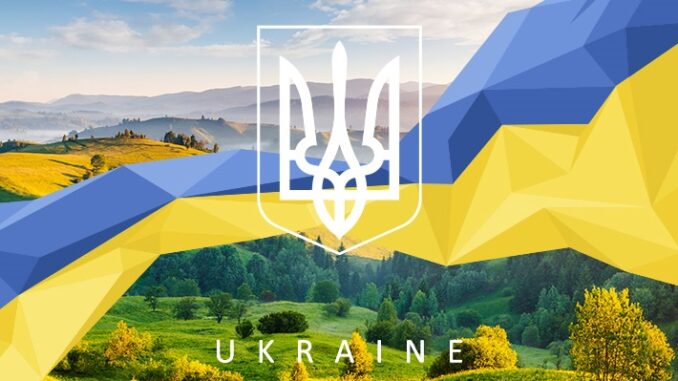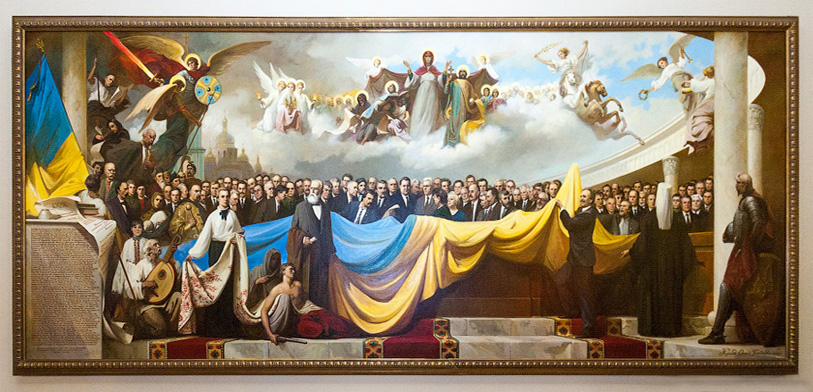Photo. The State Establishment. Artist Oleksii Kulakov // http://mankrda.gov.ua/
informacijnij-rozdil/aktualnij-komentar/evoljuciya-ukrainskogo-derzhavotvorennya/
The Ukrainians periodically lost the sovereignty of their state. These long periods of being within the other nations have given the rise of the attitude to the Ukrainians as to the people whose nature of cilivisation is incapable of establishing the own state and this attitude has been spreading during the period of the past 400 years.
Every nation, who came as the conqueror to the Ukrainian lands and controlled them, was imposing the inferiority complex to the Ukrainians to persuade that they were just peasants for buckwheat cultivation and were incapable of self-organisation into the single state. According to the mentioned, the Ukrainians, saying that, are destined to be absorbed by one of the “historic nations”. The most of the progress in this untrue foisting has been made by Moscow. However, it is not the unique case. The former colonial empires, such as Britain, Spain, Portugal or France were of the same opinion about the lands under their expansion and in the past were depicting the reality for the locals of those lands in a similar way.
The idea of the Ukrainian civilisation retardation was drawn by Moscow as derived from the philosophic content of Hegel who developed the classification of the historic nations (those who have established the own states) and the non-historic ones (those who have not created the states).
However, the historic development evidences that the Ukrainian ethnos shaping and development had been proceeding as that of the other nations.
The Ukrainians have had the peaks of the state establishment at different historic periods: Rus (Kievan Rus), the Kingdom of Rus (the Halytsian-Volynian Principality), Zaporozhian Host (Hetmanate or Hetmanshchyna), the Ukrainian National Republic, the Western Ukrainian National Republic, contemporary Ukraine (unitary multiparty republic).
Although the formation of Rus was encouraged by the Varangians, the local population was also actively participating in the state-building processes. In spite of the facts that the Rurikid dynasty was considered as the Scandinavian one, its princes were acting in favour of the local community. The development of the political will, the authorities, the economy, the culture and the social order were grounded on the local traditions with the elements of the European and Byzantine bearings. In particular, apart from the professional army (druzhyna) consisting mainly from the Varangians, there also was local people’s guard of the Ruthenians (the Ukrainians). The state was ruled by the prince dynasty, however, the People Council (Viche) had the great impact on the politics of the state. Such councils were in each city of Rus. The social relations which had begun and developed at the times of the Slavic tribe unions were consolidated in the document of Rus Law (Ruskaia Pravda), 11th century. In this document, one also can find the legal basis of the state. Until the Christian Orthodox faith of the Greek ritual had not been accepted by end of the 10th century, the religious and cultural sphere of the state was reigned by the paganism based on the Slavic believes. Thus, Rus was mainly formed due to the local Slavic or Ukrainian traditions.
During the time period of the 17th and the 18th centuries, the Ukrainians had the own state named as Zaporozhian Host or Hetmanate. For many decades, the Muscovite historians have been hypnotizing the world with the idea that Hetmanate was inferior, incomplete, under-state formation. However, the territory which had been ruled by Bohdan Khmelnytsky until the 17th century possessed all the characteristics of the state as the other European electorates and duchies. The key feature of the state was that it had the ruler (hetman) as the leader of the authorities. The authorities were presented as the councils of various levels made up from the Cossack nobility who was active in leading the society. The original administrative and territorial division was implemented on these territories. It was arranged as the regiment division with 100-warriors subdivisions (polkovo-sotennyi ustrii), which proved to be quite efficient under conditions of constant military defense of Ukraine against the neighbouring invasions. The Cossack army played the role of an important constituent of the statehood. Although the law system of this state borrowed a lot from the European legislation of that time, namely the Magdeburg Law, but it also reflected the local traditions.
Starting from the 18th century and up to the turn of the 20th century, the Ukrainians as well as many other European nations had the periods of the statelessness. However, unlike the Occitans, the Burgundians and the Gascons who entered the French nation, the Basques who are regarded mostly as the citizens of Spain, the Polabian Slavs (Elbe Slavs) who became the part of the Germans, the Welsh who were assimilated with the English, the Flemish who are participating in the Belgium state, but the Ukrainians did not merge with any nations and had a trial to renovate the own state at the beginning of the 20th century. Their state had the name of the Ukrainian National Republic (Ukrainska Narodnia Respublika). and possessed all the characteristics of the state: the Central Council of Ukraine (Ukrainska Tsentralna Rada), later the Directory or Directorate, represented the authorities on behalf of the Ukrainians while the same obligations were performed by the Ukrainian National Council (Rada) in the western territories of the country. The army was formed and included all the kind of troops of that time ranging from the infantry to the aviation. The own administrative and territorial division along with the legislative systems were being developed. The completion of these processes was interfered by the military aggression of the neighbouring countries.
Eventually, during the period of more than 1000 years, the Ukrainians managed to form different state establishments, but they were eliminated under the influence of many objective and subjective factors. The betrayals of the nobility in the 14 century and the 18th century, unfavourable geopolitical circumstances, the absences of the allies and the absence of the geographic barriers or obstacles.
Nowadays, it is more than 30 years have passed since the Ukrainians restored the own state and currently worldwide proved the own capability of the state arrangement on the own lands without any external assistance: the establishment of the governmental institutions, the self-governing, and the cultural development.

The current article relies on the open source information and quotes the book by V. Brekhunenko (Брехуненко В.А. Війна за свідомість. Російські міфи про Україну та її минуле. ‒ Київ, 2017 ‒ 280 с.)
Our Advice to Read:
1. Брехуненко В.А. Війна за свідомість. Російські міфи про Україну та її минуле.‒ Київ, 2017.‒ 280 с.
2. Гаврилів І. Україна–Росія: протиборство европейської та евразійської цивілізацій.– Львів: 3. Левада, 2018.– 107 с.: 3 л. карт.
Народження країни. Від краю до держави. Назва, символіка, територія і кордони України / К. 4. Галушко [та ін.].– Харків: Клуб сімейного дозвілля, 2017.– 352 с.: карти.– (Історія без цензури).
5. Щербак, Юрій. Україна в епоху війномиру: книга підсумків і пророцтв.– Київ: Ярославів Вал, 2020.– 352 с.
Ihor Kocherhin
the doctor of historical sciences, the head of the South-East Interregional Department
of Providing Implementation of the National Remembrance Policy in the Regional Ukrainian Institute of National Remembrance,
the head of Dnipropetrovsk Oblast Organisation of Local History Science in Ukraine,
the officer of Internal Communication Department of Moral and Psychological Support,
captain of the Ukrainian armed forces.











